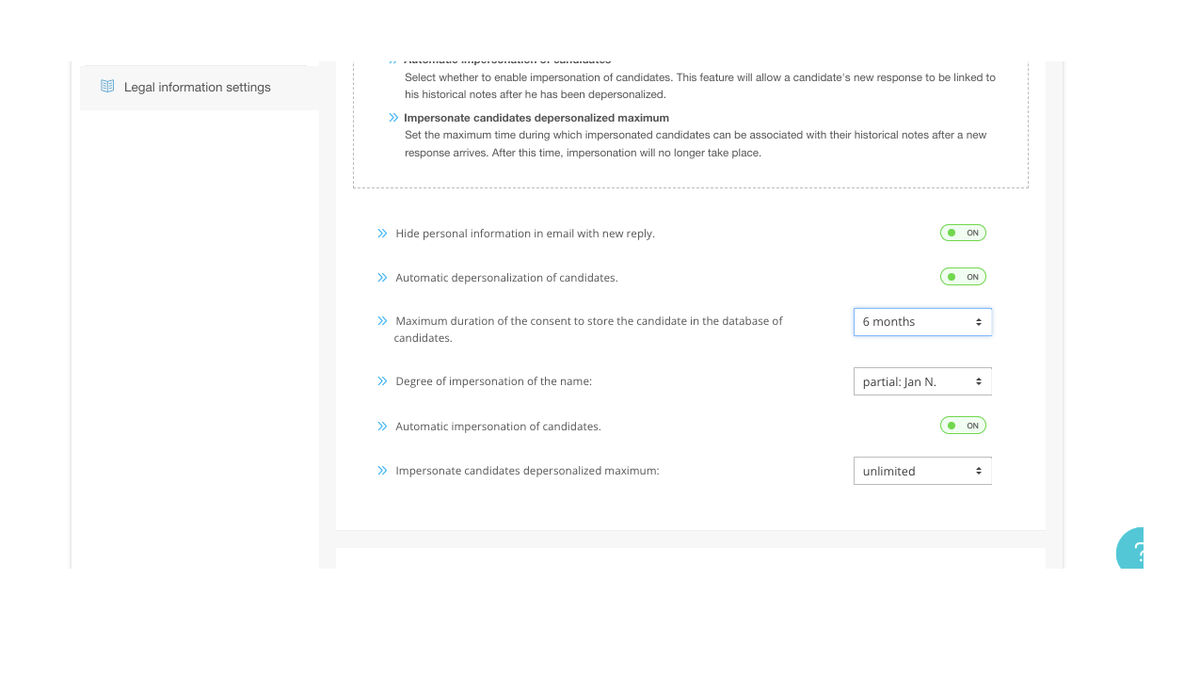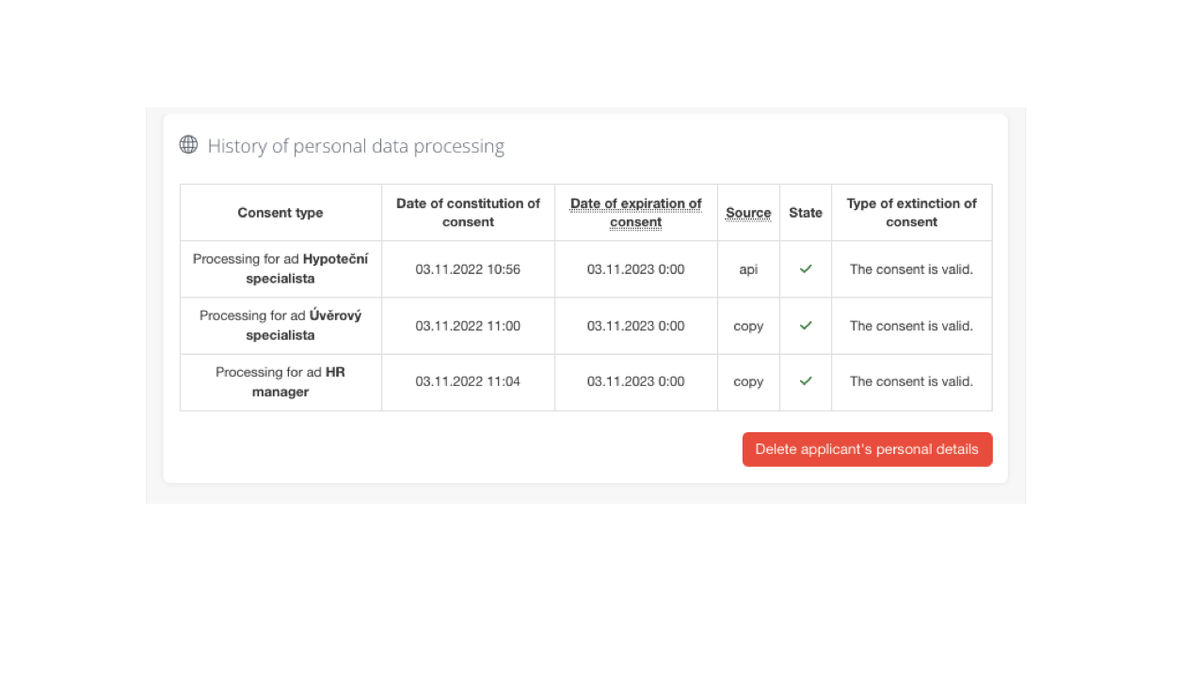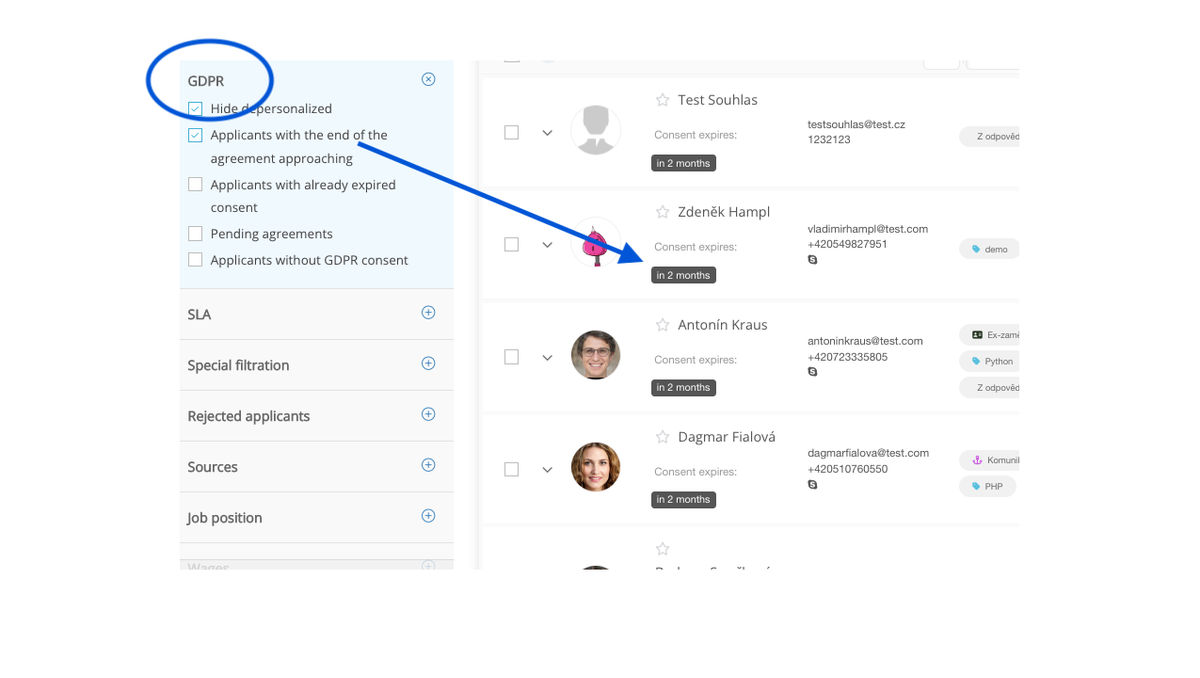GDPR consents
One of the key functionalities of ATS Recruitis is the possibility to set up and systematically monitor the legal obligations arising from the GDPR. This article offers not only an overview of the tools that ATS Recruitis offers and their settings, but also a description of practical scenarios and the implications that follow.
Basic concepts
For easier orientation, we will first familiarize ourselves with the basic terms you will encounter in Recruitis:
- Information obligation
- It is only intended to inform the candidate about the processing of his personal data as part of the response to a specific job position. This information is required by law, and by answering the job position, the candidate automatically gives you consent.
- Within the overview of approvals, you will find this information on the candidate's card as "Processing for XYZ advertisement".
- GDPR consent
- It ensures that you can store a candidate in your talent database for longer than the duration of the job they are responding to. In addition, you can also approach him in the future with another suitable job offer. Such consent must be actively "checked" by the candidate himself.
- In the overview of consents on the candidate's card, it is called "Consent to saving in the candidate database".
- The term "GDPR consent" further in the text means this term (ie not "information obligation")
- Depersonalization
- Is a tool with which the system automatically (daily) depersonalizes candidates who do not have any valid consent. You can disable this function in the GDPR settings if you want to take responsibility for the "manual" management of individual candidates and maintaining the candidate database in accordance with GDPR rules.
- Zosobnění
- On the contrary, it is a tool that automatically links an already depersonalized candidate who responds to you with his historical notes. You can also turn this feature off in the settings.
Setting up the management of GDPR consents within ATS Recruitis
You can find the settings of GDPR rule parameters in ATS Recruitis in this menu. You mainly set the following parameters:
- Automatic depersonalization of candidates and the degree of such depersonalization
- Maximum duration of GDPR consent
- Automatic impersonation and the maximum time until which the historical candidate can still be impersonated
It is also possible to set up your own templates for obtaining GDPR consents (one or more).

Ways to obtain GDPR consent
There are several ways you can get GDPR consent. Primarily, it is necessary to separate:
- Consents obtained through ATS Recruitis and its tools
- Consents obtained automatically from other sources
- Consents obtained "manually"
Specifically, consent can be obtained by the following methods:
- Manually adding a candidate - if, for example, the candidate replied to your email and you have their consent to save it in the candidate database. You can add such consent as an attachment and set its length manually when entering the candidate for the position itself.
- Automated email with a request to obtain GDPR consent - in the event that a candidate has responded to you for a position and you want to save it in the database and be able to contact him in the future, just send him an email from ATS Recruitis with a request to save. The duration of obtaining consent is set automatically according to your settings in the administration.
- Response form - in the event that the candidate has responded to you for a position within the ATS Recruitis response forms, the duration of obtaining consent will be set automatically according to your settings in the administration.
- Import of historical candidates from another system - as part of data migration, we can upload your existing talent database to ATS Recruitis, the duration of consent will be set according to the duration of the GDPR from the previous system, if the data from another system contains it.
- Job portals - if the candidate answered you automatically through another source, for example from portals such as jobs or StartupJob, the duration of the consent will be set according to their settings that they send us and that you have set within their system. If you have set a shorter processing time in ATS Recruitis, the duration of the approval from the portal will be shortened to this length.Veškeré souhlasy, které u daného uchazeče máte, naleznete dole na kartě kandidáta:

Ways to revoke GDPR consent
The specific type of termination of consent will be recorded on the candidate's card in the history of personal data processing.
- Expiration - the consent ends with the expiration of the period for which the consent duration was set.
- Revocation by the candidate - the candidate has the option to manage his personal data and withdraw consent within each email that leaves the system.
- Deletion by HR - even you, as HR, have the option to delete the candidate's personal data on the candidate's card at any time, if the candidate requests it.
Notification
The system will automatically notify you by email in the following situations:
- The candidate revoked consent to data processing. The administrators and owners of the position to which the candidate answered receive the information.
- The end of the validity of consent for a group of candidates is approaching - this email is generated once a month and contains candidates who will be depersonalized in the next 2 months so that you can still reach them, for example, by automated email. An identical list of candidates nearing the end of approval can also be obtained using a filter in the candidate database.
Tools to make working with GDPR easier
There are a whole range of tools in the system that will make your work with GDPR easier.
- A monthly email notifying candidates with an approaching end of approval
- Filters in the talent database
- Action "Request to be saved in the talent database"
- Massive
- Individual
- Email templates for communication with candidates

Frequently asked questions about GDPR
Some questions arise repeatedly during the implementation of ATS Recruitis in companies and in the subsequent operation, so it is good to mention them here as well:
| Can saved consents be edited? | No. |
| If an applicant has multiple approvals, which applies? | The one with the longest validity period. |
| I get approval for 5 years from the StartupJobs portal, but it was saved in the system for 3 years. Why? | In this case, 3 years will be the "Maximum duration of consent..." value that you set in ATS Recruitis within the ATS settings. This maximum time has priority - no agreement may be stored for a longer period. |
Related articles
Bulk tagging
You don't have to tag candidates one at a time, but you can add or remove tags from an entire group of candidates.
LinkedIn plugin
Keep an overview of contacted candidates on the LinkedIn professional network and use the option to easily download them directly to ATS Recruitis without the need for rewriting.
Linking new responses from StartupJobs
Use the automated connection with StartupJobs.cz and get notified about new answers.